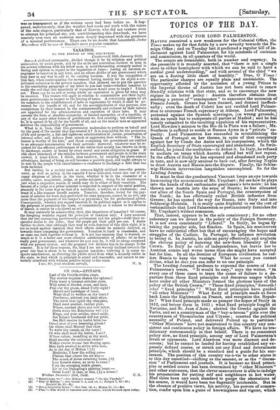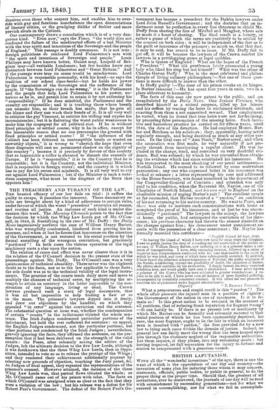TOPICS OF THE DAY.
APOLOGY FOR LORD PALMERSTON.
HAYING conceived a new weakness for the Colonial Office, the Times makes up for that foible by a new severity towards the Fo- reign Office ; and on Tuesday last it preferred a regular bill of in- dictment against Lord Palmerston for his misdeeds of omission and commission, in all quarters of the world. The counts are formidable, both in number and cogency. In the preamble it is roundly asserted, that " there is not a single state in either hemisphere with which we can be said to have a cordial good understanding," and with several of the chief " we are on a footing little short of hostility." True, 0 Times I The particular charges are equally plain and undeniable. The opportunity afforded by the accession of a young Prince to the Imperial throne of Austria has not been seized to renew friendly relations with that state, and so to encourage the new regime in its better policy : Austria therefore abstains from sending a person of " consequence" to announce the accession of Francis Joseph. Greece has been dunned, and dunned ineffect- ually; even the death of Coletti has not enabled Lord Palmer- ston to overcome French supremacy at Athens. Lord Palmerston protested against the Spanish marriages, [on wrong grounds,] with no result but to exasperate all parties at Madrid ; and he has tamely submitted to the insulting expulsion of his representative. Lord Howden's mission to the Rio de la Plata was a failure; Mr. Southern is suffered to reside at Buenos Ayres in a " private " ca- pacity. Lord Palmerston has succeeded in reestablishing the Queen of Portugal on her throne, in spite of that conspiracy against her by Conde das Antas and his companions, which the English Secretary of State encouraged and abandoned. In Swit- zerland, he joined the mediation—to defeat it. In Italy, he refused to mediate on terms which Austria offered but will not repeat. In the affairs of Sicily he has espoused and abandoned each party in turn, and is now only anxious to back out, after forcing Naples to draw Austria and Russia into the dispute. Finally, the Schles- wig-Holstein intervention languishes uncompleted. So far the Leading Journal.
It must be that the goodnatured Viscount keeps an eye towards hum ouring the monomania of Mr. Urquhart ; for see how he plays into the hands of that enthusiastic gentleman's bete noire: he has thrown new Austria into the arms of Russia ; he has alienated our allies of the South Spain and Portugal, the counterpoises of the North; he has effectually exiled British influence from Greece ; he has opened the way for Russia, into Italy and into Schleswig-Holstein. It is really quite frightful to see the sort of verisimilitude that Lord Palmerston so pertinaciously furnishes for Mr. Urquhart's wildest romances.
That, indeed, appears to be the sole consistency ; for no other coherency can we detect in the policy of the Foreign Secretary. It is not even consistently " Liberal." In Sicily, he began by taking the popular side, but flinches. In Spain, his manoeuvres have no substantial effect but that of encouraging the hopes and struggles of the Carlists. In Portugal, he inflames revolution to betray it. In Austria, he aids no party effectively, and neglects the obvious policy of fostering the new-born liberality of the Crown. To Italy he talks of independence, but leaves her to Austrian armies and worse terms than she might have accepted but for him. In all the frontier of European civilization he suf- fers Russia to keep the vantage. What he means you cannot divine, what he does you can refer to no one principle. The Leading Journal professes to expound the source of Lord Palmerston's errors. " It would be easy," says the writer, " in every one of these cases to trace the cause of failure to a de- parture from those fixed principles and decorous usages which have under all other Ministers formed the glorious basis of the policy of the British Crown." "Those fixed principles," forsooth ! what "fixed principles "? What fixed principles have guided "all other Ministers "? What fixity of principle made us force back Louis the Eighteenth on France, and recognize the Repub- lic ? What fixed principle made us pamper the hopes of Sicily in 1812, and betray them in 1821 ; what fixed principle fought at Navarino, and St. Jean d'Acre ; abetted the Greeks against the Turks, and set a countryman of the " buy-a-broom" girls over the countrymen of Themistocles and Ulysses ; asserted the political necessity of Poland, and delivered Poland up to partition? "Other Ministers" have not maintained to this country any con- sistent and continuous policy in foreign affairs. We have no tra- ditionary statesmanship in that behalf. There is no consistent policy now, no fixed principle, among any of Lord Palmerston's rivals or opponents. Lord Aberdeen was more discreet and de- corous; but he cannot be lauded for having established any ex- pressly defined course, or struck out any fixed and determinate principle, which should be a standard and a guide for his suc- cessors. The position of this country vis-a-vis to other states is to this day unsettled—shifting as the seasons, or as the " discus- sion " of Parliament and journals. It is because no fixed princi- ples or settled course has been determined by " other Ministers" and other statesmen, that the clever maneuverer is able to indulge his propensities for putting self and neighbours in hot water. Had there been any such standard to gauge the aberrations of his course, it would have been too flagrantly intolerable. But in the absence of positive views, his activity, his powers of commo- tion, confer upon him a guise of knowingness and vigour, which
deceives even those who suspect him, and enables him to over- ride with gay and facetious nonchalance the open denunciations of literary critics, or the grudging dislike of feebler and more peevish rivals in the Cabinet.
Our contemporary draws a consolation which is of a very dan- gerous kind. " Even now," says the Times, "the world does not confound the failure of the misdirected efforts of a bad Minister with the true spirit and intentions of the Sovereign and the people of England." This passage is doubly erroneous. It is not true : foreign politicians do confound Lord Palmerston's acts with "the spirit and intentions of Sovereign and people." Louis Philippe may have known better, Guizot may, Leopold of Bel- gium may—all veritable Londoners; but few besides know any distinction between Lord Palmerston and " Great Britain." And if the passage were true its sense would be mischievous. Lord Palmerston is responsible personally, with his head—so says the tradition of our school class-books—but he holds his power by the commission of the Sovereign and the sufferance of the people. If "the Sovereign can do no wrong," it is the Parliament and the people that help Lord Palmerston to his power, no- torious as he is, and permit him to retain it by not enforcing his "responsibility." If he does mischief, the Parliament and the country are responsible; and it is teaching those whose breath can unmake him, as their breath has made, that he gets all the blame and they can wash their hands of it. It is all very well to criticize the gay Viscount, to satirize his trifling and expose his inconsistencies ; but it is flattering the worst public weaknesses to make him the scapegoat for all political sins. If he is without fixed principles or settled course, why is he in office, except for the lamentable reason that no one preoccupies the ground with fixed principles or settled course? If "the influence of the Cabinet has been frittered in contemptible broils or wasted on unworthy objects," it is wrong to "cherish the hope that even these disgraces will cast no permanent shadow on the dignity of this country " ; because it is precisely by favour of this country that so lamentable a trifler is elevated to disturb the councils of Europe. If he is "responsible," it is to the Country that he is responsible ; but it is the Country, not the individual Minister, that is responsible to foreign states ; and the country it is which has to pay for his errors and misdeeds. It is all very well to cry out against Lord Palmerston ; but if the Minister is such a noto- rious scapegrace, what must be the disgrace of the State that appoints him?



























 Previous page
Previous page